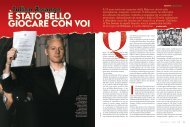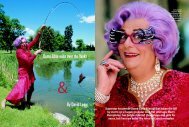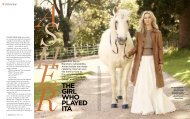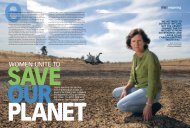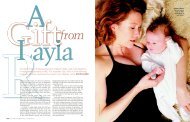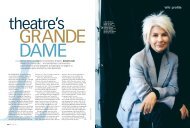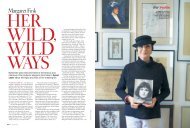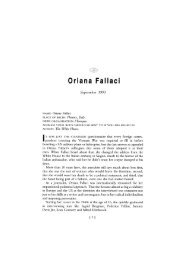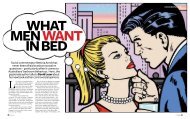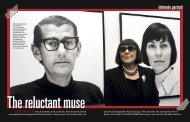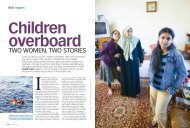The inside story of disgraced author NORMA KHOURI - David Leser
The inside story of disgraced author NORMA KHOURI - David Leser
The inside story of disgraced author NORMA KHOURI - David Leser
Create successful ePaper yourself
Turn your PDF publications into a flip-book with our unique Google optimized e-Paper software.
You remember her, don’t you? <strong>The</strong><br />
woman whose stirring account <strong>of</strong> her<br />
best friend’s honour killing caused such<br />
a sensation here four years ago – 200,000<br />
books sold in Australia alone, voted by<br />
readers as one <strong>of</strong> their 100 all-time<br />
favourite books.<br />
Perhaps it was the timing – two years<br />
after September 11, three years after<br />
a series <strong>of</strong> rapes by Lebanese gang<br />
members in Sydney – that inspired so<br />
much interest about a woman’s place<br />
in the Arab world.<br />
Here was the “harrowing true <strong>story</strong>” <strong>of</strong><br />
“Dalia”, a Jordanian Muslim who had been<br />
murdered by her father for having an illicit<br />
relationship with “Michael”, Catholic man.<br />
She had been stabbed 12 times in the chest<br />
for daring to fall in love with this Royal<br />
Jordanian Army <strong>of</strong>ficer, whom she had met<br />
while working with Norma in a unisex hair<br />
salon in the Jordanian capital, Amman.<br />
Her barbaric killing was <strong>of</strong> a kind<br />
regularly visited on women in the Middle<br />
East and Jordan in particular. Women could<br />
be killed for losing their virginity through<br />
rape or, in Dalia’s case, a few stolen kisses<br />
in a pine forest. Anything that violated the<br />
family’s honour could result in death.<br />
Norma’s book, Forbidden Love, was<br />
an attempt to try to avenge her friend’s<br />
This is Malcom knox and Caroline<br />
overington Caption Intro to go<br />
here is nulla amet wisi. Faccum ver<br />
se facil ute core core tie modiam,<br />
murder, while at the same time, issuing a<br />
worldwide call to action against this ancient<br />
practice. “I made Dalia a promise that her<br />
death would not be in vain,” she told <strong>The</strong><br />
Weekly in 2003, when this magazine – like<br />
many other publications – chose to highlight<br />
her extraordinary tale. (<strong>The</strong> Weekly<br />
published an interview with Norma, along<br />
with a six-page extract from the book.)<br />
“As long as those laws continue to exist<br />
and as long as women continue to be killed<br />
and men get <strong>of</strong>f, I cannot rest,” she said.<br />
By her own account, Norma fled<br />
Jordan after Dalia’s death in 1996 and<br />
went to live in Greece, where, between<br />
housekeeping jobs, she wrote her<br />
best-seller in an internet cafe. She<br />
was snapped up by a New York literary<br />
agent and an international publishing<br />
house, and by the second half <strong>of</strong> 2003,<br />
her book was a runaway success. She<br />
began appearing on network television<br />
in America and at literary festivals<br />
around the world, including Australia<br />
and New Zealand. She had become the<br />
literary diva <strong>of</strong> the year.<br />
I<br />
first met Norma Khouri in May<br />
2003, when I was invited to chair<br />
several panels at the Auckland<br />
Writer’s Festival. One <strong>of</strong> the<br />
panels was about the art <strong>of</strong> writing<br />
memoirs and how these personal<br />
stories helped us understand political issues.<br />
Norma was one <strong>of</strong> the three women on the<br />
panel, the other two being Kim Mahood,<br />
the Australian writer and visual artist, and<br />
Aminatta Forna, the London-based writer<br />
and broadcaster from Sierra Leone.<br />
Norma was quite clearly the star attraction,<br />
despite her being the least gifted <strong>of</strong> the three<br />
writers. Her <strong>story</strong> was dramatic, racy and<br />
it played well to people’s prejudices about<br />
Islam and backward, patriarchal Arab men.<br />
I had met Norma the night before our<br />
interview and we’d hit it <strong>of</strong>f immediately.<br />
She was warm and ebullient, and her <strong>story</strong><br />
quite clearly sensational. It reminded me<br />
<strong>of</strong> why I’d been so drawn to the Middle<br />
East as a young correspondent during<br />
the 1980s. <strong>The</strong> region held everything<br />
for me – desert traditions, messianic faiths<br />
and ancient conflict.<br />
Over dinner and a bottle <strong>of</strong> wine,<br />
Norma and I talked for nearly five hours<br />
about the tragedy <strong>of</strong> her life in Jordan<br />
and about her campaign to save other<br />
women from fates similar to Dalia’s. “I<br />
hardly sleep,” she said, talking non-stop<br />
and smoking obsessively. “I have women<br />
writing to me begging me to help them.<br />
I sit up all night answering their emails.”<br />
She talked about how much she<br />
missed her family in Jordan, particularly<br />
her mother, but how she believed she<br />
would be killed if she returned to her<br />
country. She had dishonoured the family<br />
by running away and speaking out.<br />
“I can’t go back,” she said.<br />
I was amazed by her fluency in English<br />
and her seeming sophistication with all<br />
things Western. How did she speak<br />
English so well? “Private American<br />
schools in Jordan,” she replied. And<br />
what <strong>of</strong> her exposure to Western art,<br />
music and cinema? “Oh, my God,” she<br />
gushed like a child. “I became a movieholic<br />
when I first got to Greece.<br />
“<strong>The</strong> friends I was staying with at the<br />
time said to me, ‘Have you seen the movie<br />
<strong>The</strong>re’s Something About Mary’?” And I<br />
said, ‘That’s one <strong>of</strong> the dumbest movies<br />
I’ve ever seen. It didn’t make any sense.’ But<br />
that was because, in Jordan, the American<br />
movies we saw lasted only 40 minutes. So<br />
when they showed me Something About<br />
Mary I watched it three times in a row and<br />
I couldn’t stop laughing. And I thought,<br />
‘Oooh … all the other movies, what have<br />
I been missing?’ ”<br />
It was at this point that I asked her<br />
whether she had ever had a lover. She<br />
was 34 years and had lived almost her<br />
entire life in the <strong>of</strong>ten harsh and puritanical<br />
world <strong>of</strong> the Middle East. Had she ever<br />
known what it meant to be loved?<br />
“No,” she replied s<strong>of</strong>tly. “<strong>The</strong>re was a<br />
man in Greece who I liked and we would<br />
kiss and he would hold me … but nothing<br />
more.” She was quite clearly claiming to<br />
be an Arab virgin.<br />
Three months later, when I interviewed<br />
her again at the Byron Bay Writers Festival<br />
in northern NSW, we again returned to<br />
this theme. “Now I’m turning all shades<br />
<strong>of</strong> red,” she replied when I asked, this<br />
time publicly, if she had ever had a sexual<br />
relationship. “I’d like to say that I am<br />
married to the cause, but I have had<br />
some experiences with someone that<br />
I care about deeply.”<br />
<strong>The</strong> audience was enthralled. Here<br />
she was, a standard-bearer for oppressed<br />
women, at once so alone, but so courageous,<br />
stubborn, forthright. At the end <strong>of</strong> the<br />
hour-long session, they applauded for<br />
a full 30 seconds. Many people were<br />
moist-eyed as they joined the queue<br />
to meet her, my own daughter – who<br />
happens to be named Jordan – among<br />
them. Little did we know then that she’d<br />
just misled, exaggerated or lied to us at least<br />
80 times during the previous 60 minutes.<br />
Malcolm Knox, the<br />
literary editor <strong>of</strong><br />
<strong>The</strong> Sydney Morning<br />
Herald, was standing<br />
in his kitchen playing<br />
with his one-yearold<br />
son when the phone rang one morning<br />
in February 2003. <strong>The</strong> call was a tip-<strong>of</strong>f<br />
from a Sydney-based Jordanian alerting him<br />
to information coming out <strong>of</strong> his country.<br />
Two prominent Jordanian women had<br />
become sufficiently concerned about Norma<br />
Khouri’s book to have begun compiling a<br />
dossier on the <strong>author</strong>. This would result in<br />
them asking Norma’s publishers, Random<br />
House, to reclassify her work as fiction, a<br />
request which the publishers rejected.<br />
A full 18 months transpired before<br />
Malcolm Knox was able to write the first<br />
<strong>of</strong> what turned out to be a Walkley Awardwinning<br />
series <strong>of</strong> articles with his colleague,<br />
Caroline Overington. “Norma Khouri is a<br />
fake,” he wrote, “and so is Forbidden Love.<br />
“Khouri’s real name is Norma Majid<br />
Khouri Michael Al-Bagain Toliopoulos and<br />
she only lived in Jordan until she was three<br />
years old. She has a US passport and lived<br />
from 1973 until 2000 in Chicago. She is<br />
married with two children, 13 and 11.<br />
“She has four American siblings and a<br />
mother who are desperate to hear news <br />
“I HARDLY SLEEP. I HAVE WOMEN WRITING TO ME BEGGING ME TO HELP<br />
THEM. I SIT UP ALL NIGHT ANSWERING THEIR EMAILS.”<br />
Caption Intro to go here is nulla amet wisi. Faccum ver se facil ute core core tie<br />
modiam, conulla feugait am, vullut aut diat alisis facili<br />
4 | WW MARCH 2007 WW MARCH 2007 | 5



